
Learning for Sustainable Development: “Outsiders” and “Insiders”
July 21st, 2015
“Sustainable development” is such an over-worked phrase that it has almost no meaning, any more. Politicians love it. The problem is, though, that everyone has a different idea of what they are talking about when they say these words. The concept has become blurry and vague. As I noted in an earlier blog post, “development”– at least, in the minds of many Jamaicans – is equated with progress, both human and economic.
There’s a problem, though, with sustainable development: the issues it seeks to resolve are both political and economic. However, as researcher Dr. Maria Protz of the Commonwealth of Learning (COL) pointed out during a dialogue event at the Panos Caribbean offices in Kingston this week, the process should be “open-ended and long term.” It has to be much more than a handy catch-phrase whose meaning has become diluted.
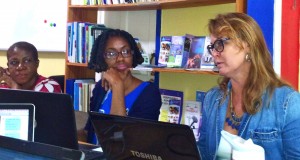
(l-r) Rosamund Brown, Indi McLymont Lafayette and Dr. Maria Protz in serious discussion. Journalists from across the Caribbean joined via Skype. (My photo)
We are talking about this in the context of the UN Millennium Development Goals (MDGs), eight specific targets set in 2000 for countries to strive towards and to reach by 2015. Results have been mixed, although the UN Development Program (UNDP) asserts that the MDGs have sparked “the most successful anti-poverty movement in history.” Jamaica has fallen down on at least two of the goals set (“reducing child mortality” and “improving maternal health”) and I am not convinced, personally, that “ensuring environmental sustainability” has been reached. The UNDP concludes that we have come out strongly, however, on poverty reduction, primary education enrollment and eliminating gender disparities in education.
In September of this year, the world will move on to new Sustainable Development Goals (SDGs). The number of goals has more than doubled, to seventeen. Some areas seem to overlap slightly. Achieving the SDGs seems an even more daunting prospect for many developing countries. It’s a timely reminder, though, that the concept of Learning for Development (and, hand in hand, Communication for Development) has been largely (and strangely) overlooked in the MDG process. Surely the MDGs and the SDGs were never intended to be just an academic exercise, were they? They were (are) intended to actually change people’s lives, for the better, right? That’s “development,” isn’t it? Yes, that’s what I thought…
So what about Learning for Sustainable Development? What should it look like, and what are the challenges? COL partnered with Panos Caribbean, with the support of the Caribbean Institute for Media and Communication (CARIMAC) at the University of the West Indies, to investigate how it is has worked so far throughout the MDG process in the region. The answer appears to be – not very well. The study, conducted from December 2014 to March 2015, describes many challenges. As one participant in the dialogue noted today, “Politics dictates everything.”
It’s all down there on paper, isn’t it. These kinds of discussions may seem far removed from everyday life, confined to board rooms and seminars and conferences. How does it translate in communities across the Caribbean region? Who are our on-the-ground “champions” of learning and communication for development? For learning and communication are closely linked; you cannot have one without the other.
In her presentation to participants in the program, researcher Maria Protz outlined some of the challenges mentioned above that she encountered during her research into regional agencies involved in the development process. The picture was not very encouraging. As we know, local non-governmental organizations have small staff and very tight budgets. Many are struggling to keep their heads above water; in fact I know at least three that are on the verge of closure. Caught in the “project cycle trap,” it is hard for these agencies to assess the impact of their work across the long term. And long term is what we need to be aiming for, despite the short-term thinking of our political leaders.
These are just one or two of the problems that complicate learning and communicating for development. Nevertheless, as Dr. Protz and others at today’s dialogue pointed to, many agencies in the Caribbean have been just going ahead and “doing it” anyway – and doing it right. In a way reflecting the philosophy of Brazilian educator Paulo Freire (author of “Pedagogy of the Oppressed” – yes, he was very political) they are not relying on the old practice of “outsiders” (consultants, international NGOs and the like) coming into communities and trying to figure out the “insiders” there. In the Caribbean, many “insiders” (community spokespersons and non-political activists of all ages, occupations and social backgrounds) are creating their own learning structures, independent of what the “modernizing” thinking of the West might wish to impose.
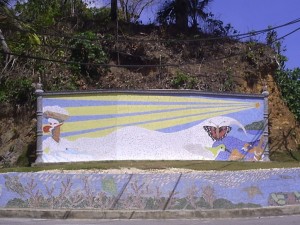
This mural entitled ‘The Washerwoman’ which was illustrated by Kenneth Fournillier, was done to commemorate the Blanchisseuse Sea Moss Project. It represents the culture of the Blanchisseuse community in northern Trinidad. (Photo: Asa Wright Nature Centre)
For example, today we heard about a project with a group of Jamaica Constabulary Force officers concerned about gender-based violence, who formed a partnership with the community radio station Roots FM. Eventually, even former perpetrators (and victims) were calling in to the station to contribute to the dialogue. Another example from Trinidad was the Blanchisseuse Environmental Arts Trust (BEAT), established in 2001 by a coalition of local artists in an economically deprived village on the north coast. The artists used visual arts to create awareness of the importance of conservation in their own community. BEAT has recently received donor support for sustainable sea-moss harvesting in the area. Another Jamaican example might be the exciting Paint Jamaica and Plant Jamaica project in inner city Kingston.
These stories have to be told, recorded, documented. The hope is that more journalists, bloggers and communicators will form alliances and establish committed, longer term “we” relationships with some of these community members. The outsiders and insiders would thus begin collaborating in a meaningful way towards development at the grassroots level. Who knows? These initiatives might very well contribute towards those lofty U.N. goals becoming a reality. On the ground.
Yes, their stories need to be told. Look! This is happening! And this, and this!
Tags: Blanchisseuse Environmental Arts Trust, Caribbean, CARIMAC, Commonwealth of Learning, Communication for Development, Jamaica, journalism, Kingston, Learning for Development, Maria Protz, NGO, Paint Jamaica, Panos Caribbean, Paulo Freire, Roots FM, sustainable development, Sustainable Development Goals, Trinidad, UN Millennium Development Goals, UNDP, University of the West Indies
The Gleaner reserves the right not to publish comments that may be deemed libelous, derogatory or indecent.
To respond to The Gleaner please use the feedback form.
2 Responses to “Learning for Sustainable Development: “Outsiders” and “Insiders””
- We Are the Zoomers
- Living Online with Humans and Birds: NAOC 2020
- Human Trafficking and the Problem of Public Education
- Down Memory Lane
- Are We Ready to Recover from COVID-19?
- Road Safety Matters: Is Your Vehicle Safe?
- Sexual Harassment, Me Too, and the Minister’s Disturbing Giggle
- The Vulnerable Senior Citizens, Private Care Homes and COVID-19
- A Muddle Over Masks
- Here is Something Life-Saving You Can Do: Give Blood!

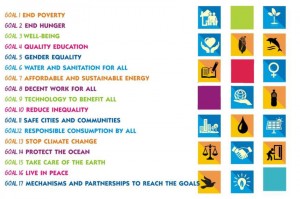
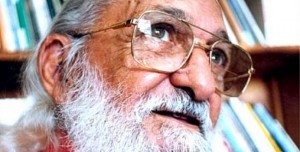
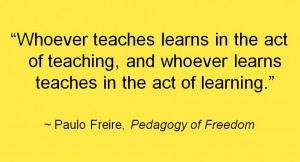


Interesting. I agree that many who speak of Sustainable Development do not fully understand the depth and breath of the concept. Sustainble Development must be discussed using a systems approach and that is not happenning. Until then, we will continue to hit and miss.
No, I agree, and it’s more “miss” than “hit” it seems. It’s just a vague concept. I hope it will be clarified and consensus will be reached on a meaningful definition, as we move towards the SDGs. Thank you for your comments.